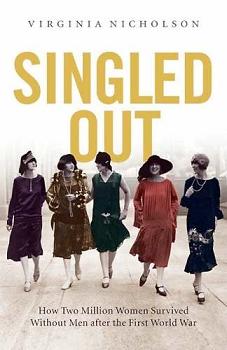
Singled Out
Virginia Nicholson
312 pages including index
published in 2007
I found Singled Out in the Middelburg library and picked it up because it looked like the sort of book Sandra would’ve enjoyed reading. She had always been interested in social history, especially of Britain between the wars and of the role women played in these years. Sandra had actually been the one who first pointed out to me why there were so many spinsters in twenties and thirties detective stories, all those women living alone in bedsit rooms or sharing a cottage together. That was something I had noticed but assumed just to have been some sort of convention of the genre, rather than something real reflected in fiction.
But that was exactly what it was, as the interwar period was the period of the “Surplus Women”, two million women for whom there was no and would be no husbands, with the “flower of British manhood” cut down in the mud of Flanders. The First World War had left hundreds of thousands British men dead and many more crippled for life and a whole generation of women without enough husbands to go around. Granted, as the raw statistics prove this was not a new situation, as in Victorian times too this had been the case, but this was the first time this gender imbalance was both large and out in the open. This time it had hit the middle and upper classes disproportionally and therefore was widely commented on in the media and felt by those women themselves. What’s more, it came at a time of huge societal changes and anxiety and, as Nicholson shows, these socalled “surplus women” played a huge role in making British society more equal to women in general.
In Singled Out Virginia Nicholson attempts to tell the stories of this generation of women, who had all been brought up with the belief that the highest possible duty and happiness for a woman lay in marriage and motherhood, having to cope with a reality in which for them this was no longer possible and for some (many?) of them it was no longer as desirable either. The realities of the First World War, in which the absence of men had forced women into roles earlier denied them had given a great many young women a taste of greater freedom already. Now that two million of them were completely unable to fullfill their traditional roles, they had to find new meaning in their life, nor were they content to be pushed in the role of the traditional spinster as free caretaker for her sibling’s children or her aged parents. Instead they became business women, college students, artists, socialists or activists, forged new roles for themselves and the women coming after them.
Virginia Nicholson has taken great care to let these women talk for themselves as much as they can at this late stage. As Singled Out was published in 2007, a lot of the women of this generation were already dead, but she has managed to find quite a lot of first hand accounts nonetheless, by interviewing those women still alive, through tracking down memoirs and dairies, as well as contemporary documents: novels, essays and newspaper articles, even poetry. The stories that she tells this way are touching, often moving.
Especially the stories of those women who did leave a husband to be on the battlefield and had to deal with that grief for the rest of their lives. I’ve after all just lost Sandra myself and can understand what they were going through, even if my grief is different from theirs.
But these stories are also inspiring, as Nicholson shows how these women, had to deal not just with the loss of their men, but also with the expectations and disapproval of much of British society and the realities of being a single woman in a world where opportunities for single women were still few and far between and there was little help for them. Yet many of them still managed to find fullfilment in life through work, through political activism or even through taking care of other people’s babies. We’re all in their debt, because their efforts helped shape our modern world.